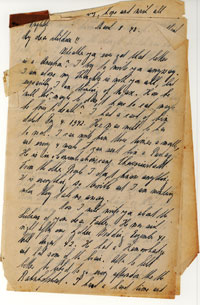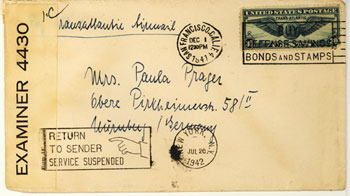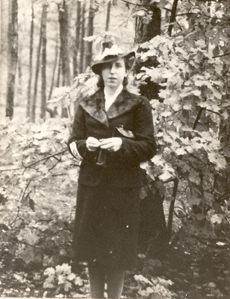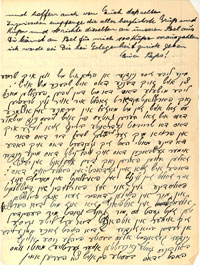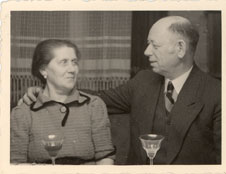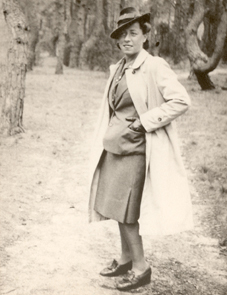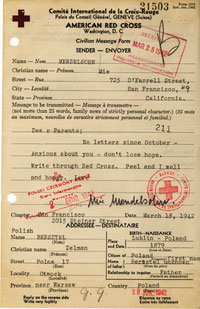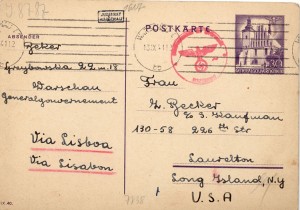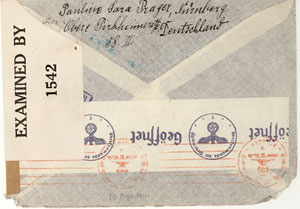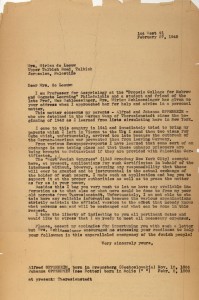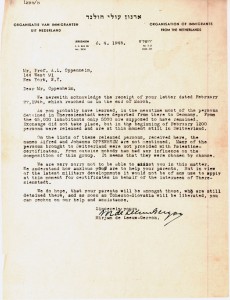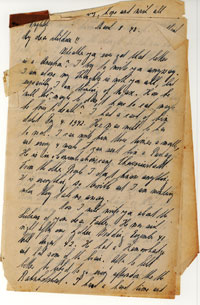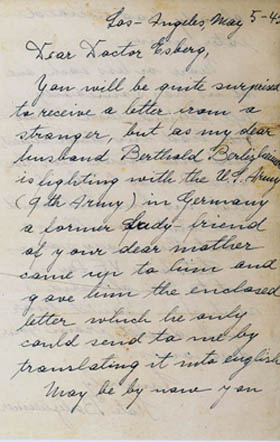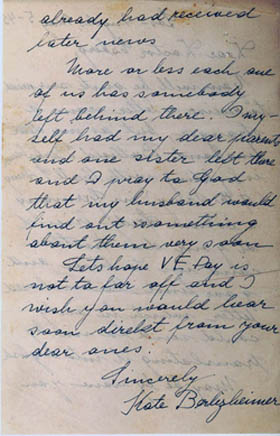Letters: 1938-1946
During the years of the Holocaust, as avenues of escape from Nazi persecution in Germany and occupied Europe disappeared, many European families found themselves separated — on one side were family members safely living in the United States or England – on the other side, family and friends subject to ever increasing dangers were living under Nazi rule and the threat of extermination.
These letters were the only means of contact between parents and children, husbands and wives, friends and relatives who had been cruelly divided. As time passed and the hope of rescue grew remote, the letter writers continued to reach out to those they loved through their letters and postcards.
The letters on display are those written by family and friends in Nazi-occupied Europe. The letters sent to them are lost. Selected from collections of the Tauber Holocaust Library’s archives, they provide an intimate view into the events of those years. Each letter is just one small part of a true story of real men, women and children trapped by dangerous events in a terrible time. The love, anguish, persistence, courage and heartbreak they express are a testament to each individual, the lives they led and those they lost.
The Letters of Mae Berschtel Mendelsohn Mandl
Members of Berschtel family were among the over 17,000 Polish-born Jews who were forced from their homes and business in Germany in late October 1938 and relocated to Poland. Marie (Mae) Berschtel left shortly after for the United States where she married Felix Mendelsohn. Mae’s brother and his wife escaped to Palestine. Mae’s parents and two sisters – Hilde and Anni – remained behind in Poland.
The letters to Mae from her parents and sisters were full of love and concern for her, and downplayed their hardships. The last postcard Mae received, dated October 12 1941, however, provides a glimpse into their privations – they tell her that they “have nothing left to sell.” Mae Mandl’s parents and sisters perished during the Holocaust.
Mae Mandl’s parents wrote to her regularly. Her father wrote in German and her mother in Yiddish. But even their intimate correspondence was limited by the Nazis. In a letter dated May 22, 1941, Hilda’s father tells Mae that writing in Yiddish is no longer permitted: “Mother didn’t get to write-one is only allowed to write in German.”
When no news came from her parents, Mae wrote to them through the Red Cross. Her message was returned to her a year later, with a note “Message was not delivered because the addressee is not at the address anymore. Unable to locate.”
The Letters of the Becker Family
The Becker family of Poland was divided both by distance and by increasingly limited opportunities to emigrate. Martin Becker and his mother Zelda were living in the United States by 1938; father Abraham and brothers Tadek and Lolek lived in Warsaw.
Postcard after postcard to Martin and Zelda pled for assistance in obtaining exit visas and boat passes. But they were helpless to rescue the father and brothers who remained in Poland. Despite the terrible obstacles to escape and the deteriorating conditions in Warsaw, in one postcard Tadek reassured his mother that they were managing well and asked her not to worry. Abraham, Tadek and Lolek Becker perished in Treblinka.
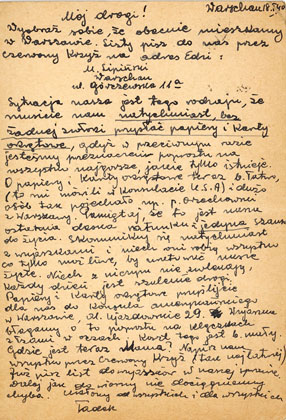
In this postcard, Tadek Becker pleads for help.
Translation is below courtesy of Ewa Basinska and Jeffrey Mifflin.
Warsaw
January 18, 1940
My dear!
Just imagine — we are presently living in Warsaw. Write and send your letters via the Red Cross to Edzia’s address…
Our situation is such that you have to send us right away, without any delay, the papers and boat passes. Otherwise we are simply destined for the worst fate that is possible. It is very easy to get papers and boat passes (this is what they told me in the U.S. Consulate) and many people left Poland that way, for example Mr. Orzechowski from Warsaw. Remember that this is our last resort and the only chance to survive.
Contact our uncles right away, to tell them that they should do all that is possible to save our lives. They should not procrastinate about anything. Each day is priceless. Send the papers and boat passes for us to the American Consul in Warsaw, 29 Aleje Ujazdowskie. We are begging our uncle, simply falling on our knees, with tears in our eyes. The cost of all of this is very low. Where is Mom right now? Write to us about all of that via the Red Cross (this is the simplest way). Write a letter to our uncles right away about our case. We will not pull through much longer than spring. Regards from all of us to all of you, Tadek.
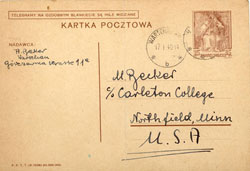
The Letters of Hilda Prager Silberberg
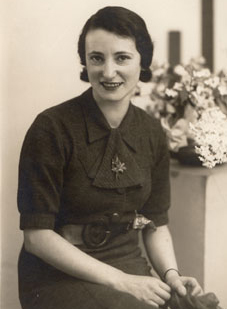 Hilda (Hilde) Prager emigrated to the United States from Germany in late 1938, leaving her mother Paula Prager behind in Nuremberg, Germany. Hilda and her mother enjoyed a close and loving relationship and corresponded frequently. From 1938-1941, Paula Prager wrote to her daughter Hilda weekly.
Hilda (Hilde) Prager emigrated to the United States from Germany in late 1938, leaving her mother Paula Prager behind in Nuremberg, Germany. Hilda and her mother enjoyed a close and loving relationship and corresponded frequently. From 1938-1941, Paula Prager wrote to her daughter Hilda weekly.
Hilda’s last letter to her mother, dated November 30, 1941, was returned to her in July 1942 with the note: “Return to Sender. Services Suspended.” Despite the best efforts of Hilda and her husband Otto Silberberg to bring Mrs. Prager to the United States, she was deported from Nuremberg in early 1942.
Hilda’s cousin wrote her on April 29, 1942: “What we have suspected for a long time has now become a fact. [They] have gone on a long journey and it will be a long time until we hear anything.” Pauline Prager was deported to Izbica, Poland and perished in an extermination camp.
Hilda kept all her correspondence from family and friends until her death. There were over 135 letters from her mother alone.
The Letters of A Leo Oppenheim
A. Leo Oppenheim and his wife Lilly left Vienna in 1938, and arrived in the United States in 1941. Dr. Oppenheim’s sister and her husband also managed to escape Austria. Their elderly parents – Alfred and Johanna Oppenheim – remained behind.
Upon his arrival in the United States, Dr. Oppenheim worked to secure his parents safety. He obtained visas to Cuba for them, but the entrance of the United States into the war in December 1941 made it impossible for the Oppenheim parents to leave Germany. They were sent to Theresienstadt.
Dr. Oppenheim’s efforts to secure his parents’ release continued long after their deaths. In 1945, he attempted to have them included in a prisoner exchange for Palestine, not knowing that they had perished in Theresienstadt the year before.
Letters Sent to Harry Goodman
Harry Goodman was the European president of Agudath Israel, a political arm of Orthodox Jewry, located in London. He spent the war years desperately trying to rescue Jews trapped in Europe.
These letters, smuggled out of Camp Vittel in France, were written on cigarette paper and the lining of a jacket. They provide names of over 250 Polish Jews about to be deported from the camp to the East, and beg for assistance in saving their lives.
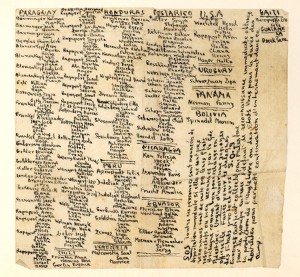
This list contains the names of over 250 Polish Jews in danger of deportation to the east from Camp Vittel.
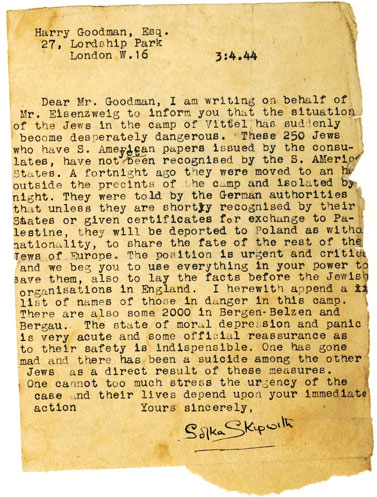
This letter documents the desperate situation of the inmates at Camp Vittel. The author, Sofka Skipwith, was named as one the of Righteous Among the Nations by Yad Vashem in 1998.
The papers of Harry Goodman were graciously lent to HCNC for this exhibit by Nachman Goodman.
The Letters of Hans Esberg
Dr. Hans Esberg lived in San Francisco during the war years. His mother remained in Wolfenbüttel, Germany. She wrote a final letter to him in March 1943, shortly before her deportation to Theresienstadt, and entrusted it to a friend to deliver.
When the United States army was fighting in Germany, this friend passed the letter on to an American soldier, himself an immigrant from Germany. The soldier, Berthold Berlizheimer, translated it into English and sent it to his wife in Los Angeles.
Mrs. Berlizheimer in turn sent the letter to Dr. Esberg in San Francisco. But Dr. Esberg’s mother had already died in Theresienstadt by the time the letter was received, over two years after it had been written.

Keep in Touch
Subscribe to our newsletter.

